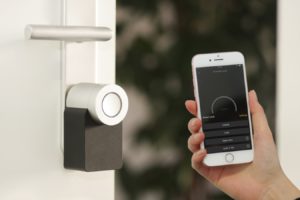
Debunking The Most Common Home Security Myths
In 2017 there were an estimated 1.4 million burglaries in the U.S., with over 67% of all burglary...

Restrictions apply*
The false alarm problem in the Chicago home security market is one that demands serious attention. Not only do false alarms waste the resources of first responders such as police and fire departments, they also put homeowners at risk of not getting an emergency response when it is needed the most which is counter to the reason for having a home security system in the first place.
While a difficult thing to hear, most false alarms are actually the result of user error. While most home security system owners understand the importance of learning how their systems work, most are still the primary reason false alarm occurs. Fortunately, a little education on how to prevent false alarms can go a long way to preventing fines and ensuring security in the future- and it comes at just the right time.
Many municipalities across the United States (and yes, even across Illinois) are starting to (or are considering) implementing hefty fines for repeated false alarms. Some local areas that have seen sharp increases in false alarms are even encouraging legislation which would make video verification (visual evidence) that a triggered alarm occurred mandatory in order to warrant a response from a police or fire department.
If you’re concerned about false alarms – and they are a major problem in the home security market in Chicago and nationwide – read through the following checklist to make sure your home security system is functioning properly and not jeopardizing your safety.
No security system? Request a free home security consultation from Security Doctors, a local and family owned provider of monitored security systems:
Keep Contact Information Up to Date: Home security system owners set up what are known as call lists when events (such as break-in’s or kitchen fires) are triggered. Monitoring companies call the list based on the type of event. For example, if the fire alarm goes off, call the fire department. If a window is broken and the motion sensor triggers an alarm, the police are called. If a air conditioning system shuts off, call the neighbor.
Sometimes however, these call lists are not set up correctly and can send emergency response teams when there is nothing more than a low battery on the system or a dog that wanders in the path of a motion sensor. By keeping contact information up to date, alarm monitoring companies can verify the emergency and then dispatch police or fire when necessary. That makes a major difference in the rate of false alarms.
Memorize Shut Off, Cancel & Panic Codes: Anyone that has ever used an alarm system knows the potential impact of not remembering important shut off or cancel codes – or not remembering them in time. Making sure that everyone that needs to be able to use these codes can do so correctly is a best practice for reducing false alarms as alarms triggered on systems with more sensitive or rigid rules can result in police or fire personnel at your door in minutes.
Create a Checklist for Arming & Disarming: Easy to follow checklists for both arming the system and disarming the system need to be in place. Systems that monitor multiple rooms and windows require more detailed guidance to ensure that alarms can be set correctly. One open or ajar door or window can prevent a system from activating correctly and put the people and things you want to protect at jeopardy. An arming or disarming checklist removes any doubt about what needs to be done.
Undergo Regular Maintenance: All forms of technology require regular maintenance and alarm systems are no different. Conducting regular monthly tests which include checking the batteries and dusting the components ensures that these systems will operate effectively when they are needed. Most alarm companies provide regular maintenance plans or can provide more detailed guidance about how to take care of the system you have in place.
Test All Sensor Placement: Motion sensors are important parts of a home security system but they can be implemented poorly or incorrectly and the result can be false alarms. It is widely known that animals like cats and dogs can set off alarms but they can also be set off by a number of other events. Poor placement of sensors around or including windows, for example, can trigger false alarms. Testing sensor placement during integration and regularly (they may be bumped or move slightly over time) can help reduce the possibility of alarm signals being sent unnecessarily.
Purchase a High-Quality System: Above all else, of course, purchasing a high-quality alarm system, such as those offered by vendors through Security Doctors , is the absolute best way to reduce or eliminate false alarms. The best technology coupled with the best implementation ensures the highest levels of security and the lowest chance of false alarms – and those concerned with home security should settle for nothing less.

In 2017 there were an estimated 1.4 million burglaries in the U.S., with over 67% of all burglary...

By 2024, retail e-commerce sales will reach a whopping $476 billion in the U.S. alone. With this sweeping...

Security solutions for homes are more advanced and convenient to use than ever before. Over the last decade...